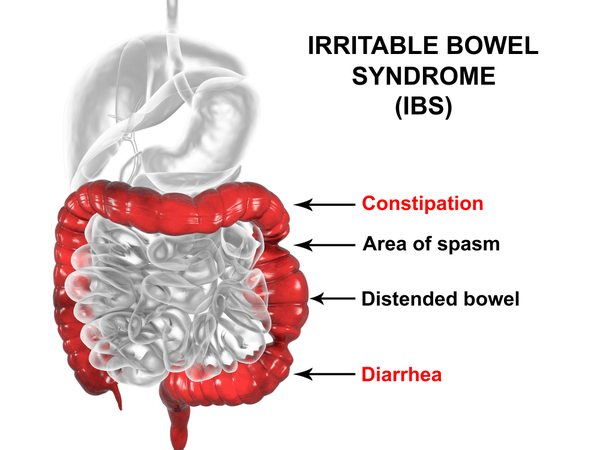The diagnosis is based on a thorough medical history and physical exam. Doctors use a tool called the Rome criteria, a list of specific symptoms and factors that can help determine if someone has IBS-C. The most important of these criteria include the presence of abdominal pain or discomfort and change in bowel habits. There are no lab tests or imaging studies that can confirm a diagnosis of IBS-C.
In certain situations, a limited amount of testing (such as blood work or imaging studies) may be needed to make sure some other condition is not present. There are also “alarm symptoms” that suggest that something other than IBS-C may causing a person’s symptoms. Examples of alarm symptoms include weight loss, bleeding, or if IBS-C symptoms start after age 50 in a person that did not frequently have these symptoms before.
IBS-C is not life-threatening. It can, however, affect a person’s quality of life. There is no cure, so the goal of treatment is to reduce symptoms as much as possible. Treatments may be focused on improving the uncomfortable symptoms of IBS-C – such as abdominal pain and bloating – or on improving bowel function. Treatments include lifestyle modifications, dietary changes, psychosocial therapy, and medications.
Lifestyle modifications
Lifestyle modifications for IBS-C include reducing or avoiding alcohol and tobacco products, improving sleep habits and getting regular exercise.
Dietary therapy
Some people find that certain foods can “trigger” or set off symptoms of IBS-C. However, the specific foods that bring on symptoms can vary widely from person to person. Increasing the amount of soluble fiber in one’s diet (for example, oats, psyllium, and flax) can be helpful. Cutting down on caffeine, soda and gas-producing foods is often recommended. Specific diets have been studied and have shown benefit for some patients. Examples include the “low FODMAP” diet (a diet that is low in certain fermentable sugars) and the gluten free diet (a diet that excludes certain proteins that are found in many grains).
It may be helpful to work with a dietitian to better understand possible food triggers. In addition, diets that exclude whole groups or types of food can be difficult to follow, and a dietitian can help make sure your modified diet is both nutritious and safe.
Psychological Therapies
Various therapies focus on treating the central nervous system and have helped patients with IBS-C. Some of these work on how the brain and mind interpret sensations, such as discomfort or bloating. Examples of psychological therapies include hypnotherapy, cognitive behavioral therapy, multicomponent psychological therapy and dynamic and/or psychotherapy. For some patients, psychological stressors can worsen IBS, such as a history of physical, mental or sexual abuse. Psychiatric conditions such as post-traumatic stress disorder (PTSD), anxiety and depression are sometimes found along with IBS-C, and treating these problems may also improve the IBS symptoms.
Treatments Targeted at Bacteria
Bacteria are naturally present in the intestines or “gut” of humans, and they play an important role in normal bowel health and function. ”Probiotic” products are foods or pills that contain live bacteria that may promote gut health. They are sometimes recommended with the goal of changing the types of gut bacteria in the intestine. This can sometimes reduce abdominal discomfort, bloating and gas from IBS-C. Experts are not sure of the overall benefit of probiotics for people with IBS; the most beneficial types and amounts of probiotic foods or supplements also are not known.
Antibiotics are another way to change the population of bacteria in the gut, but there is disagreement about this approach. While antibiotics sometimes provide symptom relief of IBS symptoms, there are potential risks associated with frequent use. If antibiotics are used too often, they can become less effective, and the risk for developing serious infections increases.
Herbal therapies
There is some evidence that peppermint oil or Chinese herbal formulas, such as a supplement called STW5, can improve IBS-C symptoms.
Medical therapy
Medications for abdominal discomfort:
Antispasmodics are a group of medicines thought to relax smooth muscle in the intestine. They are commonly used to treat IBS-C. They may have some benefit in reducing the symptoms of abdominal pain, discomfort and bloating. Certain medications designed to improve bowel function (see below) can also improve symptoms of abdominal discomfort.
Medications to improve bowel function:
Laxatives and stool softeners are often the first drugs used for patients with IBS-C to stimulate bowel movements. This is because they are relatively safe, inexpensive and widely available. Of these medicines, polyethylene glycol (found in some products sold over the counter) has the best evidence behind it, but other laxatives may be used. It is worth noting that certain non-digested sugars (such as lactulose) or sugar alcohol laxatives can increase bloating. Sorbitol is an example of a sugar alcohol and is found in many sugar-free gums and sweets.
Pro-secretory agents are a newer group of medications that moisten both the stool and the intestine so that bowel movements are easier and more frequent. These include the prescription medicines lubiprostone and linaclotide. Both medications have shown some effect in reducing abdominal discomfort and improving bowel function.
Antidepressants may reduce pain and other symptoms in some patients with IBS-C. They can modify how the gut feels pain, improve mood, and change how the intestine works to move stool along. Examples of these medications include low dose tricyclic antidepressants (TCA) and selective serotonin reuptake inhibitors (SSRI). However, in some patients, tricyclic antidepressants can actually cause constipation, so SSRI may be better suited for treatment of IBS-C.
If you have chronic symptoms of constipation and discomfort, see your doctor for a diagnosis and treatment plan to help reduce and manage symptoms, improve bowel function and increase comfort. It can make your quality of life better.
In addition, if you use over-the-counter medications regularly to reduce symptoms, you should consult a doctor to determine the best course of treatment.
Also report abdominal discomfort or symptoms that come with weight loss, bleeding, iron deficiency (low levels of iron based on blood tests) or symptoms that start after age 50. Tell your doctor about any personal or family history of gastrointestinal diseases such as cancer or inflammatory bowel disease.
To find a doctor near you who is a member of the American Society for Gastrointestinal Endoscopy, use the ASGE Find a Doctor tool at www.asge.org.








